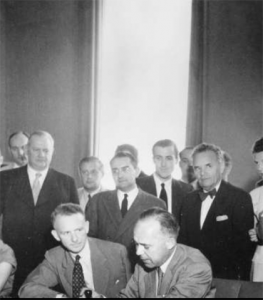Marking 70 years of the Refugee Convention
This week ay marks the 70th anniversary of the 1951 Refugee Convention, an important international agreement that established the rights of people forced to flee.
The Convention was a crucial component of international human rights law and remains as relevant now as it was when it was drafted.
 Burgeoning conflicts across the globe are seeing more and more people displaced; and this is being exacerbated by the COVID-19 pandemic and climate change.
Burgeoning conflicts across the globe are seeing more and more people displaced; and this is being exacerbated by the COVID-19 pandemic and climate change.
International commitments to support displaced people are now more important than ever and as we come out of the pandemic the world will need to reassess how we manage increased human displacement.
The 1951 Refugee Convention and the more recent Global Compact on Refugees both call for international cooperation to find a range of solutions for refugees.
But around the world, nations are becoming less welcoming to refugees and asylum seekers – just as conflicts in places like Afghanistan, parts of Africa, Myanmar, Yemen and Iraq are ramping up.
In 1967, a Protocol on the Status of Refugees broadened the scope of those in need of international protection, clearly spelling out who is a refugee and the kind of protection, other assistance and social rights they are entitled to receive.
But with the rise of authoritarian regimes, asymmetrical conflicts and migration caused climate change, it may be time to reconsider what constitutes a refugee and what a global response should look like.
The UNHCR recently released its latest ‘Global Trends’ report which shows there are now 82.4 million people displaced across the globe – more than at any time since WWII.
There are now 20.7 million refugees under UNHCR mandate, 5.7 million Palestine refugees and 3.9 million Venezuelans displaced abroad. Another 48 million people were internally displaced (IDPs) within their own countries. And 4.1 million more people were asylum-seekers.
The report says that almost three million more people were forced to flee their homes last year, even though the COVID-19 crisis restricted movement globally as countries closed borders and ordered lockdowns.
And the pandemic has made the circumstances of these people even more parlous as many are living in cramped conditions with limited access to vaccines and medical care. COVID-19 has also meant that refugee resettlement has largely been halted.
CEO of migrant and refugee settlement agency AMES Australia said that thanks to the Convention, millions of lives have been saved.
“Seventy years since it was drawn up, it is important that the international community continues to adhere to its principles,” Ms Scarth said.
She said that it was pleasing to see, the Australian government has committed to restarting its Humanitarian Settlement Program (HSP) as soon as it is safe to do so.
“The US has also been increasing its refugee intake after it fell to record lows under President Trump,” Ms Scarth said.
“AS the COVID crisis recedes into history, there will be opportunities and sound economic arguments to bring to Australia more refugees with skills that are in short supply.
“There will also be a moral imperative to offer sanctuary to more of the most vulnerable of the world’s growing number of displaced people,” Ms Scarth said.
UNHCR, the UN Refugee Agency, marked the anniversary with a statement on the importance of the convention.
“The language of the Convention is clear as to the rights of refugees and remains applicable in the context of contemporary and unprecedented challenges and emergencies – such as the COVID-19 pandemic,” UNHCR chief Filippo Grandi said.
Mr Grandi stressed the need for the international community to uphold the key principles of refugee protection as laid out in the Convention, including the right of someone fleeing persecution not to be sent back into the path of harm or danger.












